|
 Mammon
may be the deity of choice of the corporate world but there is one
higher authority to which he must pay obeisance. This is power itself.
It is the ability to shape and change organisations, careers, markets,
entire industries, sometimes, the lives of an entire nation. It
is the deafening silence that falls upon a meeting when someone
with enough of the commodity to spare raises his or her voice to
make a point. It is the raw envy an individual's achievements provoke
in people around. It is, in equal parts admiration, respect, influence,
and it is more. Mammon
may be the deity of choice of the corporate world but there is one
higher authority to which he must pay obeisance. This is power itself.
It is the ability to shape and change organisations, careers, markets,
entire industries, sometimes, the lives of an entire nation. It
is the deafening silence that falls upon a meeting when someone
with enough of the commodity to spare raises his or her voice to
make a point. It is the raw envy an individual's achievements provoke
in people around. It is, in equal parts admiration, respect, influence,
and it is more.
Definitions are important, for they delineate
who we are and what we do. When we at Business Today set out to
identify the 25 most powerful women in Indian business, we started
off by looking for a largely-objective quantifiable methodology
(confession: we are partial to numbers) that could accomplish the
task. Power, unfortunately, confounds most available metrics. So,
we decided to do the next best thing: define our universe and the
criteria we would use to identify the most powerful women in business.
The universe we decided on was, simply, women
in business. Entrepreneurs, executives, wives, sisters, mothers,
and daughters inducted into the family business, everyone would
be considered. That left out women who weren't actively involved
in business, but who exerted considerable influence (sometimes more
than those in business) simply by being close to those in power.
Infosys' N.R. Narayana Murthy, Reliance's Mukesh Ambani, and Godrej's
Adi Godrej are all powerful men and they are married to strong women
(Sudha, Nita, and Parmeshwar, respectively) who serve, more often
than not, as muse, confidant, and sounding board rolled into one.
Does that make them powerful? You bet, but the fact that they aren't
actively in business disqualifies them from this listing.
The criteria we used was equally straightforward:
to qualify for the listing a woman needed to have done one of several
things. She had to have achieved something really of note such as
becoming the country's first woman Revenue Secretary, like Vineeta
Rai did. She should have helped change her company, much like Mallika
Srinivasan changed, and is changing, TAFE. She must have created
an industry like Shahnaz Husain did the beauty one. She could have
pushed at the frontiers of commercial science like Kiran Mazumdar
Shaw and Villoo Morawala Patell did and continue to do. She had
to have helped her company chart unexplored waters (and successfully
at that), much like Shikha Sharma and Chanda Kochhar helped ICICI
Bank do. She could be at the vanguard of change in her industry,
like Meenakshi Madhvani has always been. She should have pioneered
good business practices like Anu Aga did. Or she might be in charge
of a company that through money-power, innovations, products and
services, or a combination of all changes the direction of other
companies and of individuals. Put simply, merely being a senior
woman executive wasn't enough.
Armed with these definitions Business Today's
correspondents and editors fanned out meeting consultants, analysts,
executives, the women themselves, and just about anyone else who
could provide a perspective of power. The result is the first ever
listing of The 25 Most Powerful Women in Indian Business.
 |
ARNAVAZ 'ANU' AGA
61, Chairperson, Thermax |
India Inc's
Ms Conscience
Anu Aga will certainly
not feature in the next listing of India's Most Powerful Women in
Business. She turns 62 in September 2004, and will hand over charge
as Chairperson of the Pune-based Thermax to her daughter, 37-year
old Meher Pudumjee the same month. And it isn't a certainty that
Pudumjee will inherit her mother's place in the roster, although
it is likely that she will. That's because it isn't just chairing
a Rs 771-crore energy- and environmental-engineering major on the
threshold of going global that gets Aga into the list; it's her
standing as India Inc's Ms Conscience, and one with a voice at that.
India first heard this voice on July 21, 2000, when, as a precursor
to some much-needed organisational restructuring, Aga convinced
the entire board of Thermax, including her daughter and son-in-law
to resign. And it heard it again in early 2002, when following sectarian
violence in Gujarat, she criticised the state government for its
handling of the issue. It doesn't come as a surprise, then, that
Aga plans to work actively with non-governmental organisations such
as Mumbai-based Akanksha that work towards educating underprivileged
children. "There is so much to be done, and not enough time,"
says Aga. Don't write off Aga as a softy; the lady is capable of
hard-nosed business decisions, although she admits that, "professionally,
the most difficult thing I have had to do is to ask people to leave."
Personally, too, Aga has been through a lot: her husband Rohinton,
Thermax's founder died unexpectedly in 1996, as did her son the
following year. "Pain is inevitable," says Aga. "But
suffering is up to you."
-Swati Prasad
 |
SHOBHANA BHARTIA
46, Vice Chairperson & Editorial
Director, The Hindustan Times Ltd |
Headline-maker
When Shobhana Bhartia,
then a 29-year old mother of two boys in their sub-teens (she is
married to Shyam Bhartia who runs the Jubilant Group), joined The
Hindustan Times Ltd as a Director in 1986, the eponymous newspaper
owned by the company was considered the voice of Delhi, and just
that. Today, The Hindustan Times (ht) is a 10-edition national daily
that will soon launch an edition in Mumbai, the bastion of its archrival
The Times of India, and India's largest advertising market.
That Bhartia is the daughter of Chairman K.K.
Birla helped, but only in terms of getting her first break. "Thereafter,
you have to find your place and sustain it," says the lady
who is quick to give the credit for ht's success to the entire team.
Still, Bhartia has led ht's revival from the front. Why, she even
managed to get into the history books by inking the first foreign
direct investment deal in India-she sold a 20 per cent stake in
Hindustan Times Media to Henderson Global Investors-in the media
business after the Government of India changed its FDI-in-print-media
policy.
Not everything Bhartia touched has turned to
gold. Her company's television venture, Home TV, launched in the
1990s, went belly up soon after. "It was the right media at
the right time," says Bhartia. "Only, it had five partners
and two were exiting television altogether." She decided never
to get into business with too many partners after that.
Unlike her father who was a hands-off manager,
Bhartia delegates responsibility to professional editors and managers
but prefers to oversee everything. That rules out things like long
holiday breaks although Bhartia, a self-confessed "stickler
for time" manages to find time to catch up with her reading,
especially in areas of interest such as public affairs and international
affairs by "planning my day rather than letting things drift".
It helps that "ht is more than work; it is a passion".
She'll need all of that to make a go of the Mumbai edition.
-Shailesh Dobhal
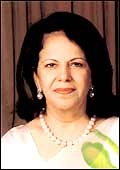 |
VIDYA CHHABRIA
54, Chairperson, Jumbo Group |
Mother's Day Out
She's the chairperson
of a $2-billion enterprise, comprising 28 companies, 20,000 employees
spread over 25 countries, and businesses as diverse as consumer electronics,
liquor and machinery. Till a little over a year ago, she was just
another corporate wife. But when Manu Chhabria passed away last April,
Vidya Chhabria suddenly found herself in the hot seat of the group,
which has $600 million worth of assets in India, including such companies
as Shaw Wallace and Mather & Platt.
So how did Chhabria slip into the role of Chairperson
(and in the process into sundry global listings, the latest being
Fortune magazine's 50 most powerful women in international business)?
For a woman who still misses her housewife days-she still plays
that role in her free time, during which she spends all the time
she can with daughters Bhavika, Komal and Kiran-leading a $2-billion
Goliath may appear overwhelming, but Chhabria does it her own way.
Working out of Dubai, she presides over the Jumbo Group Corporate
Management Board, which is responsible for outlining group strategy
and vision. Most of her companies are professionally run, so her
role is to empower her managers, and define business policy. Human
resources are indeed her primary priority, and that's why recently
she called in Mercer, the world's largest hr consulting house, to
chart out an hr roadmap for group flagship Shaw Wallace. And McKinsey
is drawing up a strategy to enhance professionalism within the group.
Would Manu Chhabria have approved? Why not!
-Brian Carvalho
The Poster-girl
LALITA GUPTE
55, Joint Managing Director, ICICI bank
ICICI bank is
a great place to look for powerful women. The bank, and the financial
institution that was reverse-merged into it in 2002, ICICI, have
always been great places to work for women, largely due to Chairman
N. Vaghul's desire to create an equal opportunity workplace. Lalita
Gupte could well be the poster girl of this revolution. She joined
icici in 1971 straight from Jamnalal Bajaj Institute of Management
Studies. Twenty-three years later she became the first woman to
sit on its board. In 1999, she was made Joint Managing Director
and COO. Today, Gupte heads the bank's international business group,
the great-white-hope-for-growth (apart from retail banking). Since
2001, she has traversed the globe pressing the flesh with regulators,
customers, and bankers and keeping an eye open for opportunities
in business process outsourcing. "This has been the most challenging
job," says Gupte, who is respected within the bank for her
ability to create leaders. Networking done, Gupte now has the task
of implementing the bank's global strategy.
 |
| ICICI Bank's leading ladies (from left):
Lalita Gupte, Chanda Kochhar, Renuka Ramanath, and Kalpana Morparia |
P.S.: By the time you read this, she would have
opened the bank's fifth office outside India, this one in London.
-Roshni Jayakar
The New New Manager
CHANDA KOCHHAR
42, Executive
Director, ICICI bank
Every time ICICI
(now ICICI bank) has done something new, Chanda Kochhar-another
Bajaj alum (she was the topper in the class of 1984)-has been involved.
In the course of the past 19 years, Kochhar who is also a cost accountant
has handled project finance; been part of the company's computerisation
drive and its new initiatives group; helped conceptualise the strategic
direction of ICICI Bank; and driven retail finance initiatives as
Managing Director of ICICI Home Finance and ICICI Personal Financial
Services. That reads like the CV of a complete banker and Kochhar
admits the retail-experience-she built a 8,000-strong team and enabled
ICICI Bank to become a large player in the market-helped her become
just that. The secret of her versatility: " The right mix of
strategy and implementation." Kochhar, an Executive Director
at ICICI Bank since 2001, has extended that fine sense of balance
to her personal life. Sure, the avid dramatist may not have the
time to don the greasepaint (she listens to music instead), but
she has managed to find enough time for her children, Arti, 14,
and Arjun, 8. She claims a good support system and an understanding
family help. As, indubitably, does ICICI Bank's culture.
-Roshni Jayakar
Lawful Presence
KALPANA MORPARIA
54, Executive Director, ICICI bank
If Kalpana Morparia
had had her way she wouldn't have been Executive Director, ICICI
Bank, and, more significantly, the organisation's most visible face.
The science graduate just wanted "to get married and have children".
But once she graduated in law, her husband insisted that she join
a law firm. After brief stints with two, Morparia signed on with
ICICI, which was looking for an in-house counsel in 1975. It was
in 1996, when CEO K.V. Kamath was looking for someone who could
head ICICI's treasury department and also serve as its public face,
that Morparia got her first big break. She was named General Manager
in charge of the legal, planning, treasury and corporate communications
departments. In 1998, her portfolio was expanded to include human
resources, planning, strategic support, and special projects, and
in 2001, she was named an Executive Director in charge of the corporate
centre of ICICI Bank. "If you treat your job as work, you tend
to be mediocre," says Morparia, "but if you think of yourself
as an entrepreneur you rise above everything else." She also
brings a woman's touch to her job. "I am sensitive to the pulls
and pressures outside the office (for my team)." Understandably,
Morparia isn't afraid to present herself as the very opposite of
the archetypal career woman. She likes shopping, cooking, and dressing
up, as she does Hindi motion pics and popular English fiction; Robert
Ludlum and James Clavell are favourites. No Grisham for the lawyer?
-Roshni Jayakar
Late-stage Angel
RENUKA RAMNATH
42, Managing
Director & CEO, ICICI Venture Funds
Three months in
1999 changed Renuka Ramnath's life. It wasn't that the engineer-MBA
wasn't an achiever before that; she was, as her stint as head of
the corporate finance and equities business at ICICI Securities
proves. In 1999 Ramnath took a sabbatical to complete a three-month
Advanced Management Programme (amp) at Harvard Business School.
"That was a mind-boggling experience," she gushes. "It
brought about a great transformation in me." She came back
with a desire to do something different. That turned out to be e-commerce
and September 2000 found her ensconsed as CEO of ICICI Eco-net.
In early 2001 ICICI merged the company with ICICI Venture and named
her CEO. Ramnath had a tough mandate. She had to motivate her team;
convince domestic investors to put in money in the late-stage investments
she decided focus on; and clean up the company's portfolio. She
also hit the road 15-18 days a month, looking for companies to invest
in, and meeting with companies in which she already had. The recent
acquisition, by the company, of a 50.17 per cent stake in Tata Infomedia
(it outbid the likes of CDC Capital and Citigroup Ventures) for
Rs 140 crore may well signal ICICI Venture's emergence as a dominant
player in the private equity business. Having raised Rs 750 crore
through the India Advantage Fund this year and with Rs 2,250 crore
under management Ramnath would like to think so. "ICICI Venture
is ideally positioned to dominate the private equity scene in India,"
she says. And it all goes back to three months in 1999.
-Roshni Jayakar
 |
SHIKHA SHARMA
44, Managing Director &
CEO, ICICI Prudential Life Insurance |
Ms Start-up
Even in the ICICI
family, with its profusion of super-achieving execs, Shikha Sharma
stands out as a start-up specialist. The IIM Ahmedabad alum, and
ICICI-lifer (she signed on in 1980) had always dreamt of running
her own company and ICICI, recognising this start-up hunger, has
sated her appetite by allowing her to hone her entrepreneurial skills
at ICICI Securities and ICICI Personal Financial Services. "I
refuse to be bound by history," says Sharma, trying to explain
what makes her a start-up person. "I will always question anyone
who says something has been always done like this, 'so, do it this
way again'." She pauses for a moment and adds, almost as an
afterthought, "Perhaps, that's why I have never hesitated to
accept assignments in areas that are alien to me." Not surprisingly,
when ICICI was looking for someone to head its insurance joint venture,
it singled out Sharma for the job. Three years after its launch,
ICICI Pru has sold 450,000 policies (sum assured: Rs 10,000 crore),
and boasts a 33 per cent share of the private insurance market.
The lady's start-up mantra of defining a vision and work towards
it, all the while perfecting things as you go along, seems to have
worked.
-Roshni Jayakar
 |
SHAHNAZ HUSAIN
58, Chairman & Managing
Director, Shahnaz Husain Group |
Flower Power
She's India's own
Anita Roddick and she lives in a house that's straight out of a
Charles Perrault-meets-Ekta-Kapoor scenario (it is called Bramblebush
Cottage) in Delhi's tony Greater Kailash borough. A somber-looking
Great Dane keeps vigil from its first floor residence; anxious-looking
gofers move around rearranging the furniture and the assorted bric-a-brac;
Sistine frescoes adorn the ceiling; a shag carpet, the floor; and
exotic birds chirp the day away in golden cages. Everything screams
that this is the residence of India's high priestess of the beauty
business, Shahnaz Husain just as the curios from all parts of the
world (Masai figurines, anyone?) advertise the eponymous chain's
600 outlets across 100 countries.
Husain is reticent about her group's turnover-a
recent report puts it in the region of Rs 400 crore-but it isn't
money or showiness that earns Princess, as she is called by most
people around her, a place on this list. Husain arguably founded
India's now-booming beauty business, took Indian herbal beauty products
global (and this was 32 years ago), and inspired a clutch of entrepreneurs
(mostly women like her) to follow her into the business. Engaged
at 14, married at 15, mother at 16, and businesswomen at 26, Husain
today runs a business empire that employs 4,000. And to think the
lady, with her feathery red mane and heavy make-up, doesn't believe
in advertising.
-Moinak Mitra
 |
EKTA KAPOOR
28, Creative Director, Balaji
Telefilms |
Bubble-queen
In television-mad
India, anyone with an idea of the 400-million audience's prevailing
tastes wields a power that is close to super-human. Not too many
people have come close to that: Ramanand Sagar did with Ramayan
in the 1980s, as did B.R. Chopra with Mahabarat, but these were
mythologicals. Vinita Nanda and Zee did with Tara, a soap opera
in the true sense, in the early 1990s, but satellite television
was still in its infancy then. The closest anyone has come to this,
however, is in the past three years; the person in question is a
28-year old school dropout whose company has churned out a seemingly
unending series of weepies, all beginning with the letter K. Ekta
Kapoor is it and she dropped out of school because she scored 53
per cent in the preliminaries of her school-leaving examination
although she was, by her own admission, "a good student".
Kapoor's first job was with an ad-film maker.
"I was a flunkey," she says. "I used to coordinate
an artiste's bangles with her clothes-that sort of thing...."
She trails off. The experience is obviously a distant memory for
a creative director who has created 35 shows, whose serials now
occupy nine out of the top 10 slots in terms of audience ratings,
and whose company Balaji Telefilms has grown into a Rs 186-crore
television-programming behemoth.
Kapoor got into television when she was 19,
but she hit upon the K-formula when she was 25. "Look at it
this way," she says. "All of us want to be the perfect
role model in whatever it is we do and that's what all my characters,
in the context of a family, are trying to do." The fact that
she can change the lives of her characters, and affect millions
of viewers, is a power-trip, admits Kapoor, but the pressure to
maintain ratings brings her back to earth. As they say, those who
live by TRPs...
-Priya Srinivasan
 |
NAINA LAL KIDWAI
46, Vice Chairman & Managing
Director, HSBC Securities & Capital Markets |
Iron Lady
She's the first
Indian woman to have graduated from Harvard Business School (in
1982), one of the very few Indian professional managers to repeatedly
figure in Fortune's listing of powerful women (amongst sundry other
surveys), and one of the best-paid bankers (male or female) in the
country. "It does puzzle me (the presence in the various listings),
but I know the day I drop out from the lists, it will make bigger
news," quips Naina Lal Kidwai, easily India's most high profile
professional investment banker.
Kidwai has been in the public eye ever since
she put together the J.M. Morgan Stanley joint venture in the mid-nineties.
Since then she's been at the forefront of a number of high-profile
deals, including the initial public offering (IPO) of Bharti Tele,
Wipro's overseas listing and the Tatas' acquisition of VSNL. At
HSBC one transaction that Kidwai is visibly proud about is the Maruti
IPO, as she had to work concurrently with the bank's equity banking
and corporate finance arms.
Always a team player-"investment banking
is about getting people with various dimensions and skill-sets together"-Kidwai
looks for that "inner exuberance" in people. "The
passion to excel is extremely important to close a deal." Such
passion has a price. So a three-week business trip to Hong Kong-
it meant missing Diwali and the husband's birthday- is par for the
course. Yet, Kidwai does make time to listen to Indian and western
classical music and for wildlife tours.
The world of investment banking may appear
very much a male thing, but Kidwai's never been fazed by the men
around her. Still, she's always been conscious of being a woman
in a man's world-which might not be such a bad thing. For, as she
puts it: "That's why I've always felt the need to work harder
and excel even more." Perhaps it's now time for her male counterparts
to play catch-up.
-Brian Carvalho
 |
RAVINA RAJ KOHLI
39, President, Star News |
High Plains Drifter
In many ways Ravina
Raj Kohli is near-perfect manifestation of the dualities that exist
in the Indian marketplace-for the business suit-clad, Classic Milds-puffing
woman who is head honcho of Star News, spending a traditional Diwali
with the family is high on the priority list. The graduate from
the London School of Journalism, who's also studied broadcast news
at the New York University, may communicate most of the time in
English, but she's equally at ease talking (and thinking) in Hindi.
"Most of us in India are bilingual, but this is a Hindi market,"
asserts the former advertising professional who's done stints at
HTA, Lintas, Grey and a couple of years in the Singapore ad world.
Advertising, radio, entertainment, music-and
now news-Kohli has been there, and is still doing it all. Still
only in her late thirties, Kohli didn't do the B-school grind (and
she's grateful for that). Career moves have always been accompanied
with dollops of risk. "When I returned from Singapore (in 1996,
to Sony), I walked into Mumbai blind. I ventured with Prasar Bharti
(when with Kerry Packer's Channel Nine) blind, I came into news
blind. I am not afraid to fail but once I get into something, failure
is never an option."
Failure hasn't been a stranger for Kohli. Her
dalliance with Kerry Packer and Doordarshan didn't go beyond 12
months, but as she inimitably puts it: "I've learnt to minimise
my circle of concern and widen the circle of influence." Star
News happened in April 2003, but not before a few months of persuasion
by Star TV CEO Peter Mukerjea. "Everyone said I couldn't do
it. And Peter said you are the only one who can do it." Kohli
for her part feels that women are capable of lending a higher degree
of sincerity, belief and passion to a job than men. It's difficult
to disagree with that as she goes about rewriting the rules of news
broadcasting in India.
-Brian Carvalho
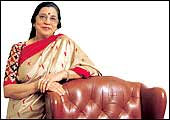 |
RANJANA KUMAR
57, Chairman and Managing Director,
Indian Bank |
Super-banker
It's a punishment-posting,"
they said. "She's just a woman, and she can't pull it off."
Three years ago, these were some of the responses that the news
of Ranjana Kumar's appointment as Chairman and Managing Director
of the Chennai-based Indian Bank evoked. Once a star in India's
banking firmament, a combination of imprudent asset management,
political interference, and plain old-fashioned corruption had turned
the bank into an ongoing advertisement for banking reform. But Kumar,
who believes that the large workforce of public sector banks is
an advantage-"If this force is channelised properly, each worker
to his or her abilities, the private sector would be left way behind,"
she says-had other ideas. "When I came here, the workforce
turned up in numbers and gave me a rousing reception," recollects
Kumar. "I felt I owed them my best."
Her best included: a whistle-stop tour of almost
all of the bank's 1,376 branches; a new vision statement; an emphasis
on training; recapitalisation; a focus on systems and marketing;
cost reduction; and an effort to prune non-performing assets (NPAs).
Today, Indian Bank is back in black and Kumar, who has been chosen
to be the next Chairman and Managing Director of NABARD (the official
notification could come any day now) would like it to emulate some
of its brethren and go down the initial public offering route.
A career banker who was educated "all
over the country" (her father was in the airforce), Kumar had
earlier worked in Bank of India and Canara Bank. But nothing could
have prepared her for the Indian Bank assignment, although the lady
herself downplays the magnitude of the challenge. "In good
times, the halo around the organisation hides everything bad within;
and in bad times, the halo hides everything good," she explains.
"I just spent all my time and energy convincing employees of
their inherent strength." Like all good leaders, she makes
it all sound so simple.
-Nitya Varadarajan
 |
MEENAKSHI MADHVANI
44, Managing Partner, Spatial
Access |
The Media-planners' media-planner
Even had she not
founded India's first media audit agency Spatial Access Solutions,
Meenakshi Madhvani would have been a shoo-in for the listing of
the most powerful women in Indian business. The lady has been there,
done that, and then some: she was a successful media planner at
Lintas and worked with clients such as HLL, Cadbury India, and J&J;
she served as Zee's marketing chief, at a time when the channel
was rewriting the rules of the television business; and she served
as the head of India's first specialised independent media outfit,
Carat.
If that weren't enough, the month-old Spatial
Access has already ruffled a few feathers among media outfits in
the country. "My outfit will find out whether an advertiser
gets value for the money spent (on media)," says Madhvani.
"Of course, I will point out a few wrong deals, but it will
increase the efficiency of media output." That's just what
some media outfits fear. Spatial Access is a labour of love (and
a smart business move). "I learned people management skills
at Lintas, legal and financial skills at Zee, fine-tuned these at
Carat, and now I am setting up an ideal organisation," says
Madhvani, listing Subhash Chandra, the late Shunu Sen, and Alyque
Padamsee as her mentors. Spatial Access has built a team of 15,
and bagged two clients; it is also considering alliances with UK
and Singapore-based media-audit firms and plans offices in Bangalore
and Delhi by end-year. Her family, adds Madhvani (she is married
to renowned ad-photographer Nrupen Madhvani and has a 15-year old
daughter) is "fundamental part of her success". Still,
it's a success she has scripted herself.
-Dipayan Basihya
 |
SULAJJA FIRODIA MOTWANI
32, Joint Managing Director,
Kinetic Engineering |
Easy Rider
She may have been
inducted into her father's company, Kinetic Engineering in 1996,
but there's no arguing the fact that Sulajja Firodia Motwani has
left her own mark on it. Back in those days, Kinetic was known as
Honda's joint venture partner for automatic-start scooters and as
a manufacturer of low-end mopeds. Today, it has split with Honda,
entered the go-go motorcycles segment of the two-wheeler market,
put its mopeds legacy behind it, and diversified into new businesses
such as auto-design and auto components. Motwani's father Arun Firodia
today oversees only the technology aspect of the business; the lady
manages all else, finance, sales, marketing, product development,
planning, and communications, with a little help from siblings Vismaya
and Ajinkya and from a clutch of professionals the Kinetic Group
has inducted since 1996.
"In 1996, we realised that the mopeds
market was shrinking and that the joint venture with Honda was preventing
us from entering the booming motorcycles segment of the market,"
says the scuba-diving enthusiast. Motwani doesn't get much time
for that, though. She may have taken just four days off when she
gave birth to a baby boy, Sidhant three years ago, but she admits
that it isn't easy being a working mother. "The child needs
you and wants to be with you and you end up living with guilt,"
says Motwani. To achieve some sort of balance Motwani divides her
time between her three priorities, son, work, and fitness, to the
exclusion of all else-shopping, partying, doing up the house, and
hanging out with friends. And she makes shorter business trips.
"I end up with crazy schedules, but am able to manage,"
she smiles. Motwani will be making a lot of those short trips in
November visiting Kinetic's new-look dealerships and monitoring
customer response to four new products.
-Swati Prasad
 |
SUNITA NARAIN
42, Director, Centre for Science
and Environment |
Radical Chic
Sunita Narain's
designation is director, CSE, an organisation founded by her late
mentor Anil Agarwal in 1980. She's a 'green' by disposition, imploring
this writer not to react to a few wasps that have decided her room
at CSE's HQ in Tughlakabad Institutional Area, a verdant Delhi suburb,
is the ideal place for an afternoon ramble. To companies that cross
CSE's path-all it requires is the willingness to put profits before
the health of customers and that of the environment-however, Narain
is the personification of Nemesis. A recent list of such would include
the Tata Group, which sent a legal notice to CSE seeking damages
of Rs 100 crore during the centre's anti-diesel campaign, most bottled-water
manufacturers, and cola majors Coca-Cola and Pepsi. If people are
known by their enemies, Narain is indeed powerful. Narain rose through
the ranks at CSE to become Director in 2000, but only after much
prodding by Agarwal who was battling cancer and wished to pick a
successor. She acquired her loathing of businessmen along the way,
for "their fixing mindset". Still, Narain hasn't let feelings
cloud judgement. "Vindictiveness never builds trust,"
she says. The lady is single, but with a network big enough (120
employees, 40 volunteers) to make a difference.
-Moinak Mitra
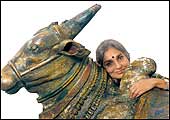 |
AMRITA PATEL
60, Chairperson, National Diary
Development Board |
The White Duchess
Not too long ago,
chroniclers of India's white revolution-the milk co-operative movement-would
have been content to consign Amrita Patel to the footnotes of history
as an add-on to the larger doings of her mentor Verghese Kurien.
Today she will get a chapter or two of her own. That's because Patel
has the requisite passion for the co-operative movement . And it's
because Patel has taken NDDB to the next level by forging marketing
alliances with milk co-operatives in various states, taking on,
in the process, the organisation's former chairman Kurien, who believes
NDDB has no business in marketing. "My mission is to professionalise
the co-operatives," says Patel, a spinster by choice and a
vet by education.
Next step: Patel would like the government
to pass the Infectious Disease (Livestock) Control Act-she is lobbying
for it-which will address issues related to livestock production.
Patel's other passion is the Foundation for Ecological Security,
an organisation she chairs; it works with village communities to
revegetate denuded land. "Ultimately, if we want more milk,
we will need more water and more fodder," says the lady. FES
is a voluntary body and has to raise the funds it requires. "Between
nine and six, I am a rich woman," laughs Patel, a reference
to her day job as head of NDDB. "For the rest, I am a beggar."
-Shailesh Dobhal
 |
VILLOO MORAWALA PATELL
48, Founder & CEO, Avestha
Gengraine Technologies |
Genetics' High Priestess
At 21, she got
married. By 31, she was the mother of two daughters and held a steady
job at Hyderabad's International Crop Research Institute for Semi
Arid Tropics (icrisat). At 37, she completed a PhD in plant molecular
biology from France's University Louis Pasteur. At 45, she founded
a company. And Dr R.A. Mashelkar, the Director-General of India's
Council of Scientific and Industrial Research describes her as "a
committed and enthusiastic visionary whose emphasis on creating
intellectual property is important to a country like India".
Doesn't read like the typical introduction to a CEO, does it?
Meet Villoo Morawala Patell, a diminutive Parsi
who attributes all that has happened to her to a childhood habit
of pushing herself to the edge. "At St Ann's Boarding in Hyderabad,
the Italian nuns who taught us used to depasir of me," laughs
Patell. "I used to sit on a chair and push it behind to find
the tipping point where it would topple; in life, I always push
myself to find the tipping point." Right now, Patell's company
Avestha Gengraine (from Avestha for the Parsi holy book, and a portmanteau
of gene and grain) is pushing at the edge of genetic crop research,
influenced in part by the lady's childhood. "While growing
up in a well-off family, I saw farmers starving because of drought;
I wanted to help them."
It wasn't easy as Patell discovered when she
returned to India in 1995. "I went to Dr Anji Reddy, who is
a good friend, and explained what biotech could do. He gave me a
budget of Rs 50,000 and asked me to write a report; I did a thing
called DNA To Drugs; he made polite noises but nothing came of it
because he felt it was way ahead of its time." Then came efforts
to start-up a R&D hotshop but "all these guys would ask
for a revenue model". So, Patell went back to Belgium and to
a company called Plant Generics System. "PGs didn't have a
revenue model but was eventually acquired by Bayer for $800 million,
all because of its IP," says Patell. "That opened my eyes."
Research grants from Rockefeller Foundation helped provide the seed
capital-other early funders include the Tata Group, Global Trust
Bank, and ICICI Ventures, which recently exited in favour of two
multinational VC funds-and Avestha was born. In three years, the
95-employee company has filed for 42 patents and been granted seven,
including the global patent for genetically-modified drought resistant
seeds. Money still remains a problem but Patell is confident that
Avestha will get there. "I am passionate about fundamental
research," she says.
-Venkatesha Babu
 |
PRIYA PAUL
37, Chairperson, Apeejay Surrendra
Park Hotels |
Boutique Lady
There's an image
of falling silver lines on Priya Paul's business card. It's the
new corporate logo of the Apeejay Surrendra Park Hotels and it is
symbolic of (what else) change. For one, popular perception of the
group has changed in the past two years after the launch of two
new Park hotels, one in Chennai and the other in Bangalore. Both
have received rave reviews for their funky interior and exterior
design, and reinforced the chain's positioning as a boutique one.
"Through the 1990s, we were constantly renovating, repositioning,
and refreshing the product," explains Paul, a natural consequence
of trying to succeed in a business dominated by mega hotel chains.
"In the recent past, we have been able to carve out this niche
of boutique hotels-small, specialised, and able to deliver an exciting
product." And there's a change in the life of Paul herself;
she recently announced her engagement to Chennai-based businessman
Sethu Vaidyanathan. "I just about managed to get engaged,"
she laughs.
Time may have been a problem. In 1990, two
years after Paul returned from the US after graduating in economics
from Wellesley College-she started working for her father Surrendra
Paul, literally days after that, helping him manage a chain of hotels-
Surrendra Paul was shot dead by terrorists. And Paul found herself
one of the few women CEOs in an essentially male-dominated business
community, something that she describes as "not so bad"
in the Indian context. Next step? "Kids," laughs Paul,
and then adds that the chain is looking for new opportunities to
grow. "The quest to reach higher is unending, and we will always
keep trying," she says. And somehow, she'll have to find the
time between all this to schedule her wedding.
-Kushan Mitra
 |
SWATI PIRAMAL
47, Head, Strategic Alliances,
Nicholas Piramal |
A Doctor In The House
Swati Piramal pretty
much calls the shots at Nicholas Piramal," says a Mumbai-based
pharma analyst. The lady demurs. "It is my husband Ajay who
is the business whiz," she says. "I just bring the value
of being a doctor, thereby being able to speak the language of the
trade." Piramal is probably saying it as it is; still, her
background as a doctor played a part in the 1988-decision of the
Piramal Group-it was a textiles major then-to acquire Nicholas,
and diversify into pharmaceuticals. "I was involved with Nicholas
Piramal right from the beginning," admits Piramal.
That wasn't her first brush with business,
though. That came soon after her marriage. The 22-year old new bride
was unwilling to see her qualification go waste and bravely marched
up to patriarch Gopikishen Piramal. His response was to build a
hospital for the family's newest member in central Mumbai, where
most textile mills were located. "I was just 22 and he just
handed the hospital to me, allowing me to run it; I had to determine
everything," says Piramal.
The entry into pharmaceuticals convinced Piramal
that she needed to upgrade her skills. So, she jetted off to Harvard
Business School for an MBA in 1992. "I live in a joint family,"
she laughs. "My sisters-in-law and mother-in-law simply took
charge of the kids (they were aged seven and 12 then); none of my
colleagues at Harvard had that advantage." Back from HBS in
1993, Piramal has been part of an enthralling growth story. Nicholas
Piramal acquired the likes of Roche, Boehringer Mannheim India,
Rhone-Poulenc, and ICI's pharmaceuticals division to grow from a
Rs 11 crore company in 1988 to a Rs 964.2 crore (net sales) one
in 2002-03. And Piramal served as the company's Director, Medical
Director and Chief Scientific Officer, before taking on her new
role. Some journey, that.
-Priya Srinivasan
 |
VINEETA RAI
59, Revenue Secretary, India |
Woman On Top
Room 128-A in Delhi's
north block, the seat of the Ministry of Finance, has a macho masculine
feel to it. After all, some of the country's most powerful bureaucrats-think
N.K. Singh, Member, Planning Commission or S. Narayan, Economic
Advisor to the Prime Minister's Office-have occupied it. The room,
the office of India's Revenue Secretary, is now occupied by Vineeta
Rai and she is the antithesis of the coldly cordial bureaucrat,
fussing over this writer's coffee. The 1968 batch Indian Administrative
Service officer is blasé about her achievements. "You
know, I am actually quite a boring person," she says repeatedly.
For the record, the history major from Delhi's Miranda College and
Massachusetts' Brandeis University, is India's first woman to hold
the post of Revenue Secretary. "But I believe my success has
more to do with my professional commitment and work than gender,"
she says firmly. That the lady takes more than a passing interest
in her job is evident from the enthusiasm she displays while explaining
how, during her short stint in the banking and insurance division
of the ministry she interacted with stalwarts like RBI's former
and present governors Bimal Jalan and Y.V. Reddy, and brought about
some much-needed reforms. "We were able to produce a good Securitisation
Act, help in the restructuring of financial institutions, ...."
She rattles off more; and so, when Rai, whose husband R.P. Rai recently
retired from government service mouths the platitude about the civil
services being a great place to work because it helps you "make
a difference", this writer believes her. Now, if she can achieve
her stated objective of meeting the tax targets presented in Budget
2003...
-Ashish Gupta
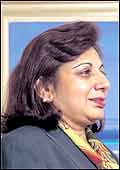 |
KIRAN MAZUMDAR SHAW
50, Chairman and Managing Director,
Biocon India |
Biotech's First Lady
If Shrikumar Suryanarayan,
an alum of IIT Delhi (he specialised in biochemical engineering),
is the President of Research and Development at Biocon, when the
41 others from his batch work outside the country, blame it on green
tiles (not greenbacks). And if a core team of biotechnologists (including
Suryanarayan) is to become India's first biotech billionaires early
next year, blame it on Biocon. Common to both is Kiran Mazumdar
Shaw who founded Biocon with an initial investment of Rs 100,000
in the late seventies. It helped that her father was a master brewer
at UB and that the company started life researching enzymes that
could be used in the liquor industry, but Shaw's move was nothing
short of a revolution. "Remember, this was the 1970s when even
men rarely ventured into entrepreneurship," says Vijay Mallya,
a childhood friend (he was the boy next door) of Shaw. Shaw herself
attributes this to her belief in "doing her own thing",
support from her father, and from her husband, John Shaw, the former
Managing Director of Coats Viyella India (her close associates believe
he has been the stabilising influence in Mazumdar-Shaw's life).
Biocon will end this fiscal with revenues of
Rs 520 crore, net profits of Rs 130 crore, 915 employees, and more
than 100 patents in various stages of approval to its name.
Along the way, Shaw has built a core team of
pros like Suryanarayan. The biotechnologist contacted Biocon in
the early 1980s because he wanted some enzyme samples for his research
at IIT Delhi; the enzymes cost Rs 300, more than a student could
afford those days; Shaw agreed to waive the amount but insisted
that Surayanarayan meet her in Bangalore; he did, they chatted,
he saw Biocon's existing facility in a garage and a new one the
company was building. "Kiran was paying meticulous attention
(to the new facility)," he recollects. "Even to the extent
of choosing green tiles for the labs; and I had worked only in dull
labs with white tiles." And next year, when Biocon's initial
public offering hits the market, some of those tiles could just
become greenbacks.
-Venkatesha Babu
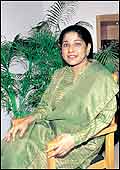 |
MALLIKA SRINIVASAN
44, Director, Tractors and Farm
Equipment |
The Quiet Empress
Not too many people
north of the vindhyas have heard of Mallika Srinivasan. Few know
that she heads one of India's most progressive tractor companies
(TAFE, and it boasts a turnover of some Rs 700 crore). Even fewer
know that she is the scion of one of the largest, most respected,
and most closely-held corporate groups in the country, Amalgamations,
and that she is married to TVS Motor Company's Venu Srinivasan.
The lady, one of the earliest Indian women to graduate from the
Wharton School of Business (this was in the mid-1980s), would like
things to stay just that way. While discussing TAFE's response to
the depressed market for tractors-the market size has shrunk from
260,000 units in 1997 to around 160,000 units now-Srinivasan always
resorts to the plural; it's always 'we', never 'I'. "It was
always teamwork," she stresses. The company, explains P.B.
Sampath, its head of finance, "was the first tractor maker
to cut production rather than incur heavy losses," a move aped
by its competitors. In her own way, however, Mallika is a revolutionary:
she went to Wharton when she was the mother of a ten-month old daughter
and she has strong views on what people should do with their lives.
It is important know what one is best suited to, she stresses, and
take that up, no matter how challenging it is, without being influenced
by peer pressure or parents to do something else, which is a better
material prospect. At the end of this short homily, she adds that
she was always interested in business. And in her own understated
way, Srinivasan is the public face of her group and is a member
of the Board of Trade and the Economic Development Board of the
Government of Rajasthan. She is also on the Executive Board of the
Indian School of Business, Hyderabad. But you didn't know about
that, did you?
-Nitya Varadarajan
 |
SIMONE TATA
73, Chairman, Trent |
Fashionista
With a perfect
coiffure, pearl strings, and all-white office in Bombay House, the
Tata Group's stately headquarters, Simone Tata looks pretty much
like a time-traveler from an earlier era. That she is: In the early
1960s-the company was founded in 1952-Tata helped build Lakme, arguably
India's best known brand of cosmetics; since then, Lakme (now owned
by HLL; The Tata Group sold out in 1998) has introduced generations
of Indian women to beauty-aids. Time, however, hasn't dulled Tata's
passion for business, her current obsession being Westside, the
retail chain owned by her company. A tepid conversation opener from
this writer about the range of apparel at Westside is quickly converted
into a feedback session on the preferences of working women; Tata
furiously scribbles notes on an oversized pad. "I believe in
listening, observing, and backing my decisions with a lot of market
research; at Lakme, we were once-removed from the customer; here
we face the customer and there is always room for improvement."
As Chairman of Trent, Tata is a "springboard for ideas, and
a sort of mentor"; Westside is managed by son Noel. Then, that's
always been Tata's style. Even in Lakme, she was a hands-on manager
only as long as she needed to be. Once the company started hiring
good managers, she was content to step back and play a guiding role.
"I believe if somebody is good, talks sense and has valid contrarian
views you must let him have his way," she says. Now, with Trent
planning a foray into the food-retail business, Simone Tata can
look forward to playing springboard, or, in her own words, "keep
moving the cheese."
-Priya Srinivasan
 |
KISHORI J. UDESHI
60, Deputy Governor, Reserve
Bank of India |
The Governor's #2
Is the deputy governor
of RBI, India's central bank, powerful? well, functionally, this
Deputy Governor is in charge of regulating and supervising the entire
banking and finance sector as well as the not inconsiderable property
of RBI; the central bank is among the richest landholders in the
country with some 49,41,027 sq m in its name. Then there's history:
past Deputy Governors include Y.V. Reddy, S.P. Talwar, S.S. Tarapore
and D.R. Mehta. And Kishori Udeshi is the first woman to hold the
post. The buck, says the career central banker (she has been with
RBI 38 years, having signed on as a trainee in the public debt office
in the Bangalore branch in 1965), now stops with her. "So you
have to be ready for everything (that could happen) and be sure
(about everything you do)," says Udeshi, who believes she has
never worked as hard as she does now. In her own way, the post-graduate
in economics is also representative of the country that is India,
an asset (not a requisite one, though) for anyone holding public
office. Udeshi hails from Kerala, was born in Karnataka, grew up
in Maharashtra, and is married to a Gujarati. The lady also used
to play a mean game of badminton-she was the junior badminton champion
of the country once-although she indulges in the less rigorous pastimes
of reading and theatre now. Still, Udeshi has stuck to the first
rule by which competitive sportspeople all over the world live:
"I always play to win."
-Roshni Jayakar
|
